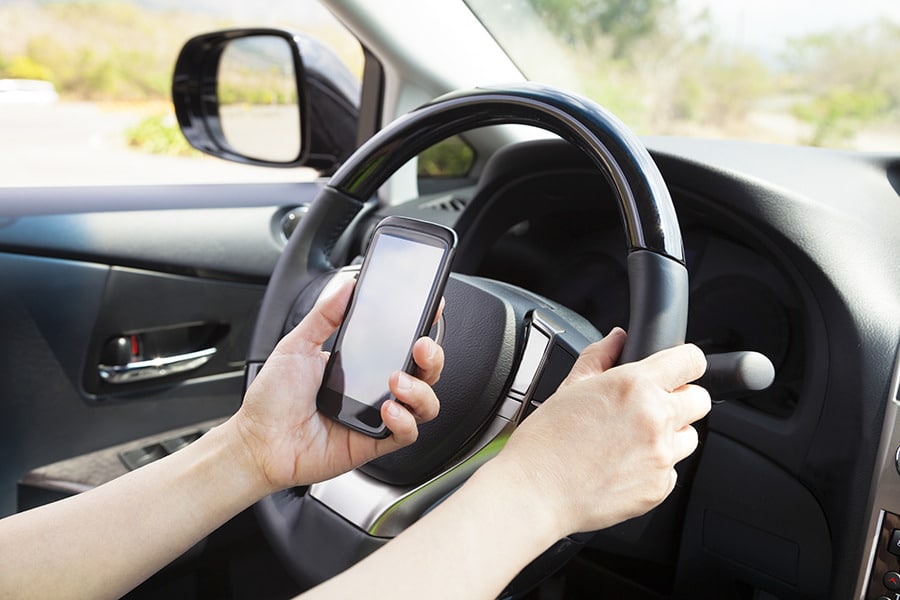Starting in 2024, Alabama joined the growing list of states making it illegal to hold your phone while driving. If you’re scrolling at a red light in Birmingham, texting on I-65 through Montgomery, or taking a call while driving through Huntsville, you’re now breaking the law. But this new law isn’t just about tickets and fines – it’s a game-changer for accident victims trying to prove the other driver was at fault.
Understanding Alabama’s 2024 Hands-Free Law: What’s Actually Illegal Now
The new law makes it clear: your hands stay on the wheel, not on your phone. This isn’t just about texting anymore. Alabama has finally caught up with the reality that distracted driving kills people every day on our roads.
Michael Strickland, founding attorney at Strickland Law Group, has seen the devastating results of distracted driving for over 30 years. “Before this law, proving someone was on their phone was nearly impossible,” he explains. “Now, if they were holding their phone, they were breaking the law. That violation becomes powerful evidence in injury cases.”
What You Can’t Do While Driving in Alabama Anymore
The law bans drivers from holding a phone in your hand for any reason while driving, including texting or typing anything even at red lights. You can’t watch videos, scroll social media, record videos, or take photos. Reading anything on your phone screen is illegal, and so is reaching for a phone if it means unbuckling your seatbelt. The message is simple: keep your hands on the wheel and your eyes on the road.
What You Can Still Do (The Legal Way)
You’re still allowed to use hands-free features like Bluetooth or speaker phone, and GPS is fine if your phone is mounted – just not in your hand. Emergency calls to 911 are permitted, and you can use one finger to answer or end a call. Listening to music or podcasts through your phone is perfectly legal as long as you’re not holding the device.
Penalties for Breaking Alabama’s Cellphone Driving Law
Alabama is serious about enforcement. Police officers can pull you over just for seeing a phone in your hand – they don’t need another reason. The penalties get worse each time you’re caught.
For your first offense, you’ll face a $50 fine and 1 point on your license, plus possible insurance rate increases. Get caught again, and it jumps to $100, 2 points, and almost certain rate hikes. Third or subsequent offenses mean $150 fines, 3 points on your license, risk of suspension, and major insurance consequences that could last years.
If you cause an accident while on your phone, these penalties are just the beginning. You could face criminal charges, lawsuits, and crushing financial responsibility for injuries you cause. Michael Strickland, partner at Strickland Law Group, has seen these cases destroy people financially: “A moment of distraction can lead to millions in damages. The new law makes it easier for victims to prove that distraction.”
How the Hands-Free Law Strengthens Your Alabama Injury Claim
Here’s where this law becomes crucial for accident victims. When someone hits you while breaking the hands-free law, you have powerful ammunition for your injury claim. A driver breaking the law when they hit you is negligence, plain and simple. Juries understand that, and insurance companies know it.
Proving Distracted Driving After Your Accident
The new law gives accident victims better tools to prove fault. Police citations for phone use become evidence of negligence. Witness testimony about seeing a phone carries more weight than ever before. Traffic camera footage can show illegal phone use, and phone records can be subpoenaed to show activity at crash time. Even vehicle data from newer cars can reveal distraction patterns that prove your case.
Why This Matters for Your Compensation
When the other driver violated the hands-free law, it affects your case in several powerful ways:
- Breaking the law makes it much harder for them to deny fault
- Insurance companies know juries hate distracted drivers, leading to higher settlements
- Clear law violations often lead to quicker resolutions without lengthy court battles
- Conscious law-breaking might even justify punitive damages in severe cases
Common Distracted Driving Behaviors That Cause Alabama Accidents
Even with the new law, people still take dangerous risks every day. Texting at red lights remains common – many drivers think it’s safe when stopped, but when the light turns green and they’re still looking down, rear-end crashes happen. In Birmingham’s busy intersections, this causes daily accidents.
GPS fumbling is another major problem. Trying to change destinations or fix routing while driving causes drivers to swerve, miss turns, and cause accidents. The solution is simple: mount your phone and set your route before driving.
Social media scrolling, especially among younger drivers, continues despite the dangers. Instagram, Facebook, and TikTok aren’t worth dying for, yet the addiction to checking feeds while driving persists. One video could cost lives.
Alabama’s business professionals often think they’re too important to disconnect. Taking work calls and checking emails while navigating Montgomery or Mobile traffic is now illegal without hands-free setup, but many still risk it for the sake of productivity.
Steps to Take If a Distracted Driver Hits You in Alabama
When you suspect the other driver was on their phone, taking the right steps protects your claim and strengthens your case.
1. Tell the Police Officer Immediately
Point out if you saw a phone in their hand. Ask witnesses what they saw and request the officer check for phone use. Make absolutely sure any suspected phone use gets into the police report – this document becomes crucial evidence later.
2. Gather Evidence at the Scene
Take photos of everything, especially the other driver’s car interior where you might see a phone on the seat or floor. Look for phone mounts or holders that might show habitual use while driving. Get contact information from every witness, as their testimony could make or break your case.
3. Preserve Electronic Evidence
Your lawyer can subpoena phone records that show exact timing of texts, calls, and app usage. This digital trail often proves distraction even when drivers deny it. GPS data can prove they were moving when they claimed to be parked.
4. Document Your Damages Thoroughly
Keep every medical record and bill, no matter how small. Document missed work and lost wages with pay stubs and employer letters. Track your pain and recovery in a daily journal. Save receipts for all accident-related costs, from prescriptions to transportation to medical appointments.
Safe Driving Tips to Avoid Breaking Alabama’s Hands-Free Law
Strickland Law Group doesn’t just fight for accident victims – they want to prevent crashes. Before you drive, set up all Bluetooth connections, mount your phone properly, set your GPS destination, send any last texts, and turn on “Do Not Disturb While Driving” mode.
If you absolutely must use your phone, pull over safely and park. Voice commands are your friend – use them. Let passengers handle your phone for you. Or simply wait until you reach your destination. That text or call can wait.
Smart technology makes compliance easier. Android Auto and Apple CarPlay put essential functions on your car’s screen. A quality phone mount keeps your device visible but hands-free. Good Bluetooth speakers mean never holding your phone for calls. Apps that auto-reply to texts while driving let people know you’ll respond when it’s safe.
Frequently Asked Questions About Alabama’s Hands-Free Driving Law
Can I hold my phone at a red light or stop sign? No. The law applies whenever you’re driving, including when stopped in traffic or at lights. You’re still operating a vehicle and must stay hands-free. Only use your phone when legally parked.
What if I need to call 911 in an emergency? Emergency calls to 911 are the only exception. You can hold your phone to call for help if there’s a real emergency. But be prepared to explain why you couldn’t pull over first.
Can police search my phone if they pull me over? Police can’t search your phone’s contents without a warrant just because of a hands-free violation. But they can note if it was in your hand and issue a citation. In accident cases, phone records can be subpoenaed later.
How do police prove I was holding my phone? Officers can testify they saw you holding your phone. Some departments use cameras. In accident cases, witnesses often see phone use. Your phone records can also reveal activity at the exact time of impact.
Will my insurance rates go up if I get a ticket? Most likely, yes. Insurance companies view hands-free violations as serious safety risks. Multiple violations could dramatically increase your rates or even lead to policy cancellation.
What if the other driver denies using their phone? This is where experienced lawyers make the difference. Strickland Law Group knows how to subpoena phone records, find witnesses, and use technology to prove distraction. Don’t let them lie their way out of responsibility.
Why You Need an Alabama Distracted Driving Accident Lawyer
Insurance companies will try to minimize the importance of hands-free violations. They’ll argue the phone use didn’t cause the crash, or that you were partially at fault. With Alabama’s contributory negligence law, being even 1% at fault means you get nothing.
Strickland Law Group brings unique advantages to distracted driving cases. With over 30 years fighting Alabama insurance companies and more than $1 billion recovered for clients, they have the experience that matters. Over 100 cases taken to trial shows insurance companies they mean business. Their deep knowledge of technology and phone records helps prove cases others can’t. They have the resources to prove distraction when others would give up.
The new hands-free law gives accident victims more power, but only if you know how to use it. Don’t let a distracted driver’s carelessness ruin your life without fighting back.
If you’ve been hit by a distracted driver in Alabama, call Strickland Law Group at 334-269-3230. Their experienced trial attorneys know how to use the new hands-free law to strengthen your case and maximize your compensation.

